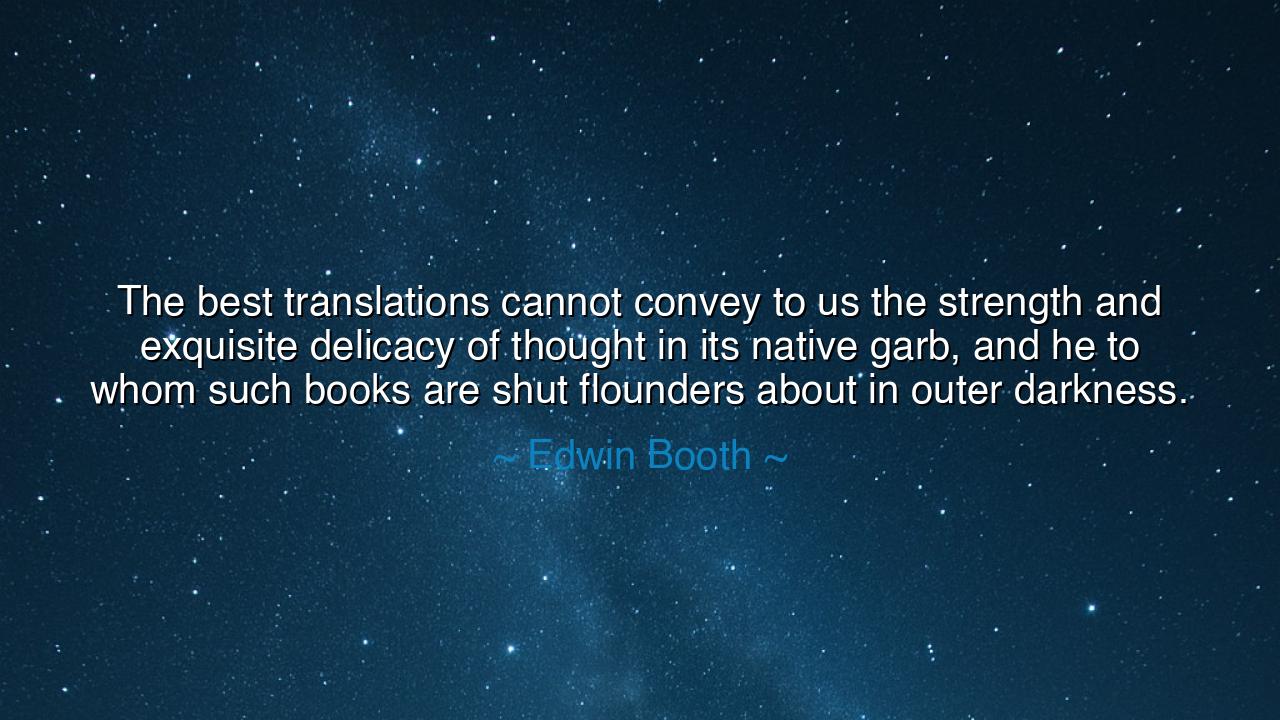
The best translations cannot convey to us the strength and
The best translations cannot convey to us the strength and exquisite delicacy of thought in its native garb, and he to whom such books are shut flounders about in outer darkness.






The words of Edwin Booth shine like a lantern upon the hidden treasures of the human mind: “The best translations cannot convey to us the strength and exquisite delicacy of thought in its native garb, and he to whom such books are shut flounders about in outer darkness.” Here is no idle complaint, but a profound truth: that language is not a mere vessel, but the very soul of thought itself. To read only in translation is to gaze at a garden through glass; one sees its form, but the fragrance, the breath of life, is lost.
For in every tongue there are rhythms, nuances, whispers of meaning that no translation can fully carry. The strength of a word may be its bold sound, its roots in history, its echo of battle and triumph. The delicacy of thought may lie in a turn of phrase, a metaphor, a shade of tone that vanishes when clothed in another tongue. Booth, an actor steeped in Shakespeare, knew this truth well: that the fire of poetry and the subtlety of meaning are bound tightly to the language in which they were born.
Consider the Greeks, whose words gave birth to philosophy. When Plato spoke of logos, he did not mean merely “word” or “reason” or “speech,” but a union of all three, a cosmic order of meaning itself. Translators may choose one shadow of the word, but the full light escapes. Or think of the Hebrews, whose psalms resound with a rhythm and intensity that tremble with divine breath in their own tongue, but lose some of their living fire when torn from their original garb. To those unable to touch the original, a veil remains; they walk in “outer darkness,” longing for the flame they cannot fully feel.
History gives us too the example of Goethe, who read the poetry of Persia in its original tongue and declared that translation alone could never carry the heart of Hafiz. In his West-Eastern Divan, Goethe sought not only to render Persian verse into German, but to enter into its spirit, to let the fragrance of the East permeate his own poetry. His attempt reminds us of Booth’s warning: that without the original, we are but wanderers on the edge of meaning, hearing echoes of a music we cannot truly sing.
This truth humbles us. For it teaches that language is not only a tool, but a gate into the soul of a people. To be locked out of it is to lose access to their wisdom, their sorrow, their joy. How many treasures of India, of China, of Africa remain hidden from those who know not their speech? How much of their strength and their delicacy is dulled by the filter of another’s tongue? Booth’s words are a cry to seek beyond translations, to honor the original, to learn the speech of those whose thoughts we revere.
The lesson, then, is not to despise translations, but to recognize their limits. They are bridges, not destinations. If one cannot cross into the original, the bridge is precious; but the one who can walk the road of the language itself finds riches that no bridge can carry. To study languages is not vanity—it is an act of reverence, a way of honoring the soul of another culture, a way of piercing the veil that separates surface from essence.
Practical action lies before you. Choose one language not your own, and begin to walk its road. Do not be content only with translations; seek the original, even if only in fragments. Listen to the rhythms, taste the syllables, feel the breath of a people in their own words. And when you read in translation, do so with humility, remembering that you are hearing an echo, not the song itself. In this way, you will step from outer darkness into the light of true understanding.
So let Booth’s words endure: that the strength and delicacy of thought live most fully in their native garb, and that to whom such books are shut, life is dimmed. Let us seek not only to hear the voices of the past, but to hear them as they truly spoke, so that the wisdom of the ages may flow to us unbroken, in all its richness, its passion, and its truth.






AAdministratorAdministrator
Welcome, honored guests. Please leave a comment, we will respond soon